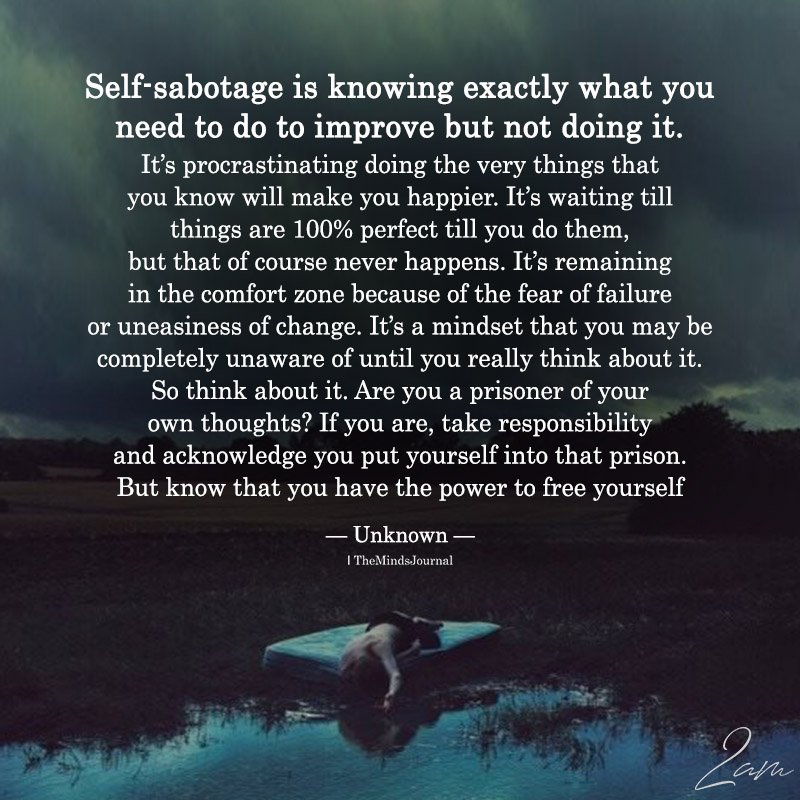Do you ever feel like you’re your own worst enemy? Well, you’re not alone. “How do I stop self sabotaging myself?” is a question that haunt many people out there, including me. Especially when we notice patterns that hold us back.
Whether it’s procrastinating, doubting your abilities, or setting unrealistic expectations, self sabotaging behavior can sneak into your life and derail you from achieving your goals. However, there’s always light at the end of the tunnel.
Understanding why this happens and why you feel this way can make a huge difference and can actually help you tackle this head-on. Today, let’s talk about what does self sabotage mean, examples of self sabotaging behavior, and how you can deal with it.
Related: 5 Signs You Are Self-Sabotaging Your Prosperity
What Does Self Sabotage Mean?
Self sabotage happens when we, ourselves, undermine our abilities, potential and values, without even realizing it. Basically, you directly prevent yourself from achieving your goals and dreams by engaging in certain negative behaviors.
Self sabotage can manifest in various ways (more on that later). Essentially, you get in your own way, creating obstacles that affect and hinder your success and well-being.
Recognizing and working to change such self sabotaging behaviors is crucial for your personal growth, and for living a more fulfilling life.

Okay, now that we know what does self sabotage mean, let’s explore how they manifest.
Examples Of Self Sabotaging Behavior
- Procrastinating important tasks
- Ignoring self-care and your mental health
- Perfectionism and never feeling satisfied with your efforts and results
- Overindulging in alcohol, food and other forms of substance abuse
- Constantly comparing yourself to others
- Overcommitting to too many tasks at once
- Avoiding responsibilities and commitments
- Setting unrealistic goals and expectations
- Focusing on past mistakes instead of learning from them
- Sabotaging your personal relationships due to lack of trust and jealousy
- Giving up or quitting at the first sign of difficulty
- Not asking for help when needed, and feeling that you have to deal with everything alone.
- Choosing to stay in unhealthy relationships
- Fear of failure or success
Now that we know how self sabotage manifests, let’s finally answer this question “how do I stop self sabotaging?”.
How Do I Stop Self Sabotaging? 6 Best Things You Can Do For Yourself
1. Learn to embrace imperfection.
It’s high time you stop obsessing about perfectionism. One of the worst sorts of self sabotaging behavior is perfectionism and there must have been so many times you have come in your own way by setting impossibly high standards.
It’s important to celebrate the small wins too and acknowledge that making mistakes are a part of your journey. Always aim for progress over perfection. Think of life as a work in progress, where every step, no matter how small, counts.
Embracing imperfection does not mean lowering your standards; it means being kind to yourself and understanding that growth is a messy process.
So the next time, you feel the urge to make everything perfect, take a deep breath and remind yourself that good enough is often more than enough.
2. Visualize your future self.
Have you ever tried chatting with your future self? Now, this may sound odd, and funny even, but trust me, this is a game-changer!
Picture yourself a year from now having overcome your self sabotaging behaviors. How do you feel? What have you achieved? This visualization can be incredibly powerful.
When you connect with your future self, you create a sense of accountability and purpose. Write a letter from your future self to your present self, talking about everything that you have achieved and succeeded in.
This can actually serve as a powerful reminder of why you need to stay on track and help you make decisions that align with your long-term goals.
Related: 5 Ways You’re Sabotaging Your Life And Relationships
3. Develop a “Success Ritual”.
“How do I stop self sabotaging myself?” If this question keeps on haunting you, then you should really try this hack out! This Success ritual doesn’t have to be anything grand or time-consuming. It could be a quick jog outside, a 5-minute meditation, over even a power pose in front of the mirror.
The secret is consistency. When you start your day with an empowering ritual that boosts your mood and mindset, you are setting a positive tone for what’s to follow. This proactive approach can go a long way in building resilience and keeping you focused on your goals.
After a point, you will notice that these small actions are creating significant momentum, making it easier for you to stay on track and avoid self sabotage.

4. Practice radical self-compassion.
Be your own biggest cheerleader. When you catch yourself slipping into self sabotage, practice self-compassion.
Talk to yourself the way you would to a friend who is struggling; will you be hard on them, or are you going to be sensitive and compassionate towards them? So, offer yourself that same kindness, encouragement and understanding.
Understand that everyone, inlcuding you has setbacks, and that they don’t define your potential or worth. Developing this habit can diminish the power of negative self-talk and help you build a more positive mindset and attitude.
Over time, treating yourself with compassion can help you break free from the cycle of self-sabotage and foster a more positive and encouraging relationship with yourself.
5. Engage in micro-challenges.
I know big goals can seem really intimidating and challenging, which can lead to even more self-sabotage. So, why not break them into smaller challenges? Micro challenges are basically tiny, manageable tasks that contribute to your larger objective.
For example, if you are planning on writing a book, start with writing only a 100 words a day.
Micro challenges actually makes the process feel less daunting and provide a steady stream of accomplishments to keep you motivated. Moreover, they help you in building good habits and a sense of routine.
Celebrate each and every completed micro challenge as a victory, no matter how small. This sort of a mindset and approach can really help you progress without the pressure and stress that often trigger self sabotaging behaviors.
6. Have a “Failure Fund” for yourself.
“How do I stop self sabotaging myself?” If this is what you keep on asking yourself, then why not create a “Failure Fund” for yourself? I know what you are thinking. Failure? Am I asking you to deliberately fail in your endeavours? Am I promoting failure? Well, no.
Having a failure fund means having a contingency plan. Failures are bound to happen, there’s no two ways about it. However, knowing that you have enough resources to fall back on in case of failure, can reduce the fear of failure and encourage you to take risks.
When you set some money and time aside for dealing with setbacks, you are doing a favor for yourself. For example, set some money aside for unexpected expenses related to your goals, or schedule extra time in your week to handle any hiccups.
This safety net can really give you the confidence to push forward without being paralysed by the fear of things going wrong. Moreover, it shows you’re prepared for the unpredictable nature of growth.
Related: How to Stop Self-Sabotage: 2 Proven Ways
Bottomline
Breaking free from self-sabotage requires effort, yes. But once you crack the code, and gradually use these strategies for improving yourself, you will see the magic for yourself.
These unique and effective hacks can help you overcome self-defeating habits, empower you to achieve your goals and live a more fulfilling and happier life.
What does self sabotage mean to you? Do you think you have a tendency of engaging in self sabotaging behaviors? Let us know your thoughts in the comments down below!
Want to know more about how you can stop sabotaging yourself? Check this video out below!









Leave a Reply
You must be logged in to post a comment.